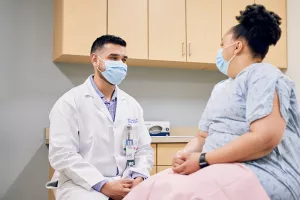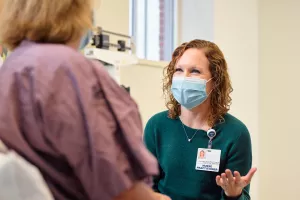When cancer cells start growing out of control in the female reproductive system — cervix, ovaries, uterus, vulva and vagina — it's known as gynecologic cancer. Routine screenings like a pap test and HPV DNA tests are smart ways for women and people assigned females at birth (AFABs) to be in tune with their gynecologic health.
Hope + healing for people with gynecologic cancers
Gynecologic cancers aren't as common as other types of cancer, but they do affect many people and their loved ones each year. About 100,000 people are diagnosed with gynecologic cancers annually in the United States.
We know that the best care makes you feel like a person, not a patient. Wherever you are in life's journey, you can trust our team to over-deliver on your gynecologic care.

Conditions
You can count on us to provide compassionate, knowledgeable care for people living with:
Gynecologic cancer symptoms
Gynecologic cancers don’t tend to show symptoms early on. As the disease progresses, symptoms like the following may appear:
- A lump in the affected area
- Abnormal bleeding not related to periods
- Bloating
- Changes in bowel habits
- Difficulty eating or feeling full
- Frequent and urgent urination
- Increased abdominal size
- Pain and tenderness
- Pelvic or abdominal discomfort
- Skin color changes
- Vaginal itching or burning that does not go away
It’s important to know that these symptoms may be a sign of another, less serious condition. To err on the safe side, we recommend talking with your gynecologist right away if you’re experiencing any of the above symptoms.
Testing
If your doctor believes the discomfort you're living with is linked to gynecologic cancer, we'll turn to the following tests to confirm a diagnosis.
Our radiology team has years of experience looking for and finding gynecologic cancers. Depending on your symptoms, your doctor may recommend the following imaging tests to confirm a diagnosis:
Your doctor may also order these tests to gain a better understanding of your condition:
- Biopsy: Your doctor removes a small portion of cells or tissue for lab analysis.
- Pelvic exam: Your doctor inspects your pelvic area for any lumps or other abnormalities.
Diagnosing cervical cancer
Early cervical cancer generally produces no signs or symptoms, but can be found with screening methods, like:
- Pap test: Formerly called a pap smear, a pap test is a procedure where your doctor collects cells from the cervix to look for anything unusual.
- HPV DNA test: Cervical cancer is almost always caused by human papillomavirus (HPV) infection. We perform an HPV DNA test to learn if you've been exposed to certain types of HPV that can sometimes lead to cervical cancer.
If you have abnormal pap or HPV test results, your doctor may perform the following tests to confirm a cervical cancer diagnosis:
- Colposcopy: Examines your cervix for abnormal cells with a special microscope.
- Cone biopsy (conization) or LEEP (loop electrosurgical excision procedure): Removes a cone-shaped area of cervical cells. This procedure allows your doctor to obtain deeper layers of cervical cells for testing.
Diagnosing ovarian cancer with surgery
A surgical biopsy is an exploratory surgery used to confirm if you're living with ovarian cancer. It involves removing as much of the tumor as possible in a process known as "debulking," an important first step in treating ovarian cancer.
Leading up to surgery, your doctor may order a blood test called CA-125 to look for the specific CA-125 protein marker. Nearly 80% of women and AFABs with advanced ovarian cancer have elevated levels of this protein marker, making it a helpful indicator for doctors that you may be living with ovarian cancer.
Knowing your levels is important because we use this data to benchmark your body's response to treatments during follow-up evaluations.
Diagnosing vulvar cancer
Your doctor may examine your vulva with a special lens (colposcopy) to look for abnormalities. Sometimes, skin on the vulva can look suspicious and require a closer look under the microscope for vulvar cancer cells. We can remove some or all suspicious skin on the spot for follow-up examination by one of our expert pathologists.
Treatments
Living with gynecologic cancer is complex, but understanding your next steps doesn’t have to be. Tried-and-true treatments for gynecologic cancers usually include surgery, radiation therapy, chemotherapy or a combination of these methods.
While radiation therapy and chemotherapy are among the most common approaches for destroying cancer cells, the therapies are performed differently.
Radiation therapy uses high-energy X-rays to destroy the cancer cells. It may be given either outside the body (external radiation therapy) or inside the body (internal radiation therapy).
Chemotherapy uses one or a combination of drugs to kill the cancer cells. Intraperitoneal chemotherapy delivers cancer-fighting drugs directly to your ovarian cancer cells.
Gynecologic cancer surgery
There are a handful of proven surgeries we can explore to treat your gynecologic cancer. We consider the extent of your cancer plus your overall wellness goals before recommending a surgical approach, like:
- Cone biopsy
- Hysterectomy (remove the uterus)
- Radical hysterectomy (remove the uterus, cervix and upper vagina)
- Removal of lymph nodes in the pelvis
We also specialize in the following minimally invasive treatments for gynecologic cancer:
- Laparoscopic surgery, also known as keyhole surgery, allows surgeons to operate on the abdominal area through a very small incision.
- Robotic-assisted surgery is a less invasive approach to traditional surgery and empowers surgeons with an extra level of precision.

From regular office visits to inpatient stays, find the healthcare you need and deserve close to home.

Meet the doctors and care team devoted to supporting you every step of the way along your path to better health.